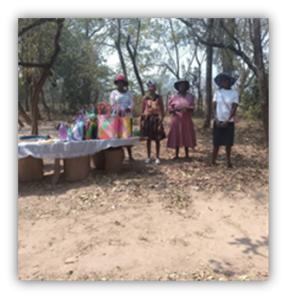Scaling Up Nutrition Stories of Positive Change: Cultivating a Brighter Future – How One Women’s Group in Chipinge is Transforming Food and Nutrition Security and Livelihoods
District Food and Nutrition Security Committees (DFNSCs) form the nucleus for tackling food and nutrition security in a coordinated and holistic manner, with specific core functions. They lead the coordination of food and nutrition security activities at the sub-national level by providing a platform for interaction among relevant Government ministry representatives, development partners, academia and civil society. In this collaborative framework all stakeholders are accountable for ensuring that their sectors meaningfully engage and contribute to improving food and nutrition security at all their levels of operation within the identified national priorities.
Manicaland – Gender-based violence (GBV) casts a long shadow, not only inflicting physical and psychological trauma but also severely undermining household food and nutrition security. It disrupts access to food and limits women’s ability to earn income. The tragic reality is that food insecurity can in turn exacerbate GBV creating a devastating cycle.
But in Ward 19 of Chipinge District, Manicaland Province a remarkable group of women is breaking this cycle and sowing the seeds of change.

A Safe Haven Blooms into a Hub of Empowerment
The United Hands Women’s Group started off as a crucial support group, a safe haven for women who had endured abuse and gender-based violence at the hands of their spouses and in-laws. Recognising their commitment to ending GBV and improving household food security, various stakeholders including the Ministry of Women Affairs, Community, Small and Medium Enterprises Development (MWACSMED), Agricultural Technical and Extension Services (AGRITEX), the Ministry of Health and Child Care (MOHCC), the Rural District Council, local leadership and partners came together. These different stakeholders are part of the Chipinge District Food and Nutrition Security Committee (DFNSC).
Through this collaboration the women received invaluable training in a range of income-generating activities, including vegetable production, solar drying, packaging and basket weaving.
Cultivating Success: From Land to Enhanced Livelihoods
The group sought and secured a piece of land from the local Rural District Council, a hectare on which they are now producing vegetables, fruits and tubers. Despite their piece of land being unfenced, their entrepreneurial spirit shines through. They also put up a traditional hut from which they cook traditional dishes and sell by the roadside.
Their hard work and dedication are yielding incredible results significantly impacting livelihoods as well as food and nutrition security:
- Improved Household Income and Reduced GBV: The proceeds generated from these activities are used in supporting their families and the group members are now experiencing peace in their families as they are contributing to household income. This has led to GBV cases declining in the community, breaking the vicious cycle that can result from GBV’s impact on food security.
- Enhanced Food and Nutrition Security: Food and nutrition security has been enhanced. The group actively discourages low calorie/empty calorie unhealthy foods for children, promoting nutritious options like instant sweet potato porridges.
- Value Addition and Market Access: They are excelling in value addition of carrots, cassava, madhumbe, finger millet and sorghum creating diverse products such as:
- Packaged dried carrots and beetroot
- Processed cassava mealie-meal
- Pineapple and mauyu drinks
- Colourful basketry and earrings on display
- Dried shredded beetroot
- Cooked and dried sweet potatoes instant meal porridge
- Regional Recognition and Income Generation: The group has often times been invited to regional platforms to showcase their work and realise income from such activities. They also display their wares by their hut.
Lessons Learned and a Vision for the Future
This success story highlights several key lessons:
- Multisectoral Collaboration Works: A multisectoral approach is yielding results, with MWACSMED identifying victims of GBV and training conducted by MOHCC and Agritex. This demonstrates the effectiveness of the DFNSC’s collaborative efforts.
- Community Ownership is Critical: Community programme ownership is critical in the sustainability of the programmes in the long haul.
- Empowering Skills Lead to Income: Undertaking training on vegetable drying, packaging and value addition can equip individuals with knowledge and skills to reduce post-harvest losses, extend product shelf life and create marketable value-added products, ultimately boosting income and contributing to food security. The beneficiaries generate income from their produce.
The training received by the women has been transformative, equipping them with new knowledge and skills in solar drying of vegetables, vacuum packaging of produce and value addition. Participants learned about various drying methods like solar drying and oven drying, optimising drying conditions to minimise nutrient loss and hygiene and safety practices to prevent contamination. In packaging, they gained knowledge on choosing appropriate packaging materials and techniques for different market needs. For value addition, they learned to develop products like vegetable powders and spice mixes, formulate recipes, understand market demand and even basic costing, pricing, marketing and sales strategies. Food safety and quality control along with business planning were also integral parts of their training.
Looking ahead, continued collaboration between sectors/strengthened multisectoral approach to issues in communities is highly recommended, along with community ownership of programmes contributing significantly to their sustainability and market research for export. The next steps involve support for expansion, monitoring, record keeping and documentation of activities.
The United Hands Women’s Group in Chipinge is not just an inspiring success story; it is a powerful example of how empowering women through improved livelihoods and food and nutrition security can transform lives and build a more peaceful and prosperous community.



